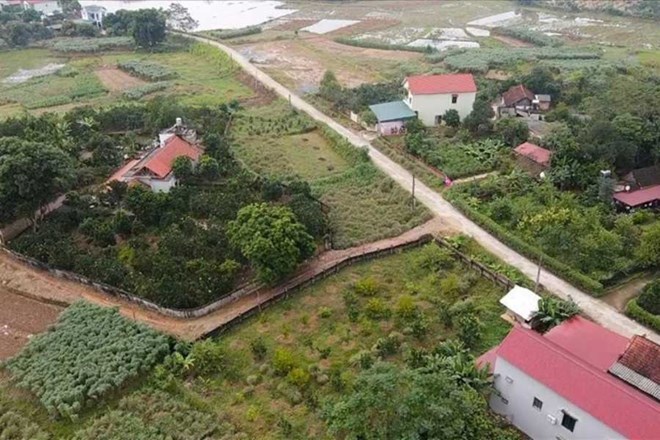Hanoi land prices increase sharply
According to the revised land price list of Hanoi City applied from now until the end of 2025, most land locations have been adjusted to increase in price 2-6 times compared to the old price list, the average increase is about 3.5 times.
In which, the district area increased from 190 - 270% compared to the old level; in districts and communes of the town about 150 - 190%; commercial service land in the central area increased by 50 - 100%, suburban area 30 - 50%; agricultural land price increased by about 15%.
According to regulations, the new land price list of Hanoi City will be applied to calculate land use fees when the State recognizes land use rights, changes land use purposes; calculates land rent; calculates related taxes such as land use tax, income tax from land use rights transfer; calculates fees in land management and use; calculates compensation for damage caused in land management and use; calculates starting prices for land auctions...
Ms. Nguyen Hoai An - Director of CBRE Hanoi branch assessed that the adjusted land price list of the capital is closer to market price and will have certain impacts on real estate types.
"The most obvious positive point is to limit the situation of two-price transactions in the market (buyers and sellers declare prices on transfer contracts lower than the actual price to reduce taxes and fees).
At the same time, the increase in land prices also increases the efficiency of site clearance for projects that are still behind schedule due to site clearance issues," said Ms. An.

However, the expert said that because the increase in the new land price list is quite sudden compared to the old price list, it will affect costs related to land use fees, site clearance costs, and transfer transaction fees, which all use the land price list as the basis for calculation (or reference).
"The impact may vary between types and properties of real estate, but in general, it has an impact in the direction of increasing costs for entities using, exploiting and trading real estate," the expert said.
Need fundamental solution
According to Dr. Nguyen Van Dinh - Chairman of the Vietnam Association of Realtors (VARS), the development of a land price list based on market principles is an important step forward, realizing the provisions of the 2024 Land Law and Resolution 18 on land use management. This opens up opportunities to remove bottlenecks in project approval, while increasing real estate supply and reducing pressure on the market.
However, it is necessary to consider the negative impact when land prices are based on the current market, where supply is low and demand is high, prices are pushed up or abused. "If this "virtual price" is used as a legal basis, there is a risk of creating a vicious cycle: real estate prices continue to increase, making it difficult for people to access, while businesses are under great pressure on costs," said Mr. Dinh.
According to Mr. Dinh, Hanoi's new land price list will impact business groups, including financially capable businesses: Able to meet the new price level but must increase product prices, putting pressure on the market.
Small businesses, weak finances: Face the risk of stopping operations or having to transfer projects. However, the law stipulates that financial obligations must be completed before transferring, adding to the difficulty.
Enterprises renting land for production and business: Must bear higher rental prices, leading to increased product costs and reduced competitiveness in the context of cheap imported goods flooding in.
"These consequences not only reduce investment attraction but can also hinder long-term economic development. Land revenue, although increasing in the short term, is difficult to sustain," he said.
Therefore, he proposed the solution of developing a method of calculating land prices based on the development stimulation mindset, instead of focusing only on increasing budget revenue. Completing standard measurement tools, issuing periodic real estate price indexes, similar to stock indexes, to ensure prices are close to reality.
Provide support policies for essential production and service businesses, reduce tax burden and land rental costs. And require real estate transactions through trading floors to ensure transparency and accuracy.
Land valuation should be carried out on the basis of actual transactions and development support, in order to both meet legal requirements and create momentum for the socio-economy.










